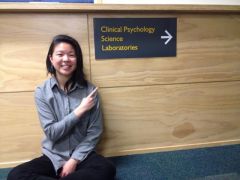As a young child, Andrea Chin was always fascinated by humans – what made humans tick, what drove people to do the things they do, and how consequences can shape further behaviour.
“In fact, that very last statement is a core principle of operant conditioning. When I learnt about operant conditioning and what it was in first-year psychology, I knew immediately that I wanted to be a psychologist. Up until then, all I knew was that I wanted to help people in some way. Becoming a doctor was a sensible option, then I discovered that I could combine psychology and helping people - and become a clinical psychologist!”
Andrea is working towards her PhD under the supervision of Dr Richard Linscott whilst concurrently completing a Postgraduate Diploma in Clinical Psychology.
“Studying towards a postgraduate diploma in clinical psychology is wonderful. Every individual has his or her own unique story and life circumstances.”
Andrea explains that clinical psychology involves a lot of detective work – thinking about how pieces of the puzzle fit together to explain the issues people may be experiencing, and to provide a guide on how best to help them move their life forward. And yes, there can be a lot of paperwork required at times, but it is a small price to pay to be able to work in such a challenging and exciting area, she concedes.
Coming to New Zealand from Singapore, where mental illness is quite often swept under the rug, she has found the contrast between the two countries astounding.
“Comparatively, New Zealand has a strong focus on mental illness - that got me thinking - how does culture influence the perception and prognosis of mental illness?”
Furthermore, there is research suggesting that the personality style of an individual - whether they are more independent or interdependent - can either gel or clash with their external culture to affect their mental health outcomes. Andrea is keen to look more into this area also.
“For my PhD research, I aim to investigate whether a personality culture clash results in poorer mental health outcomes. I also have a particular interest in the content of positive symptoms (e.g., delusions/hallucinations), which people with psychosis experience. As there are suggestions that people in collectivistic cultures experience more benign voices compared to those in individualistic cultures, I wonder how personality-culture clash may influence this phenomenon. Optimistically, I hope to be able to conduct some of this research in Singapore, looking at the predominantly collectivist culture there and comparing this with the predominantly individualistic culture of New Zealand.”
Apart from her studies, Andrea is also involved with the Department of Psychology in other ways – she is currently a 200-level demonstrator and also involved in the Otago Psychology Student Committtee (OPSYC), an amazing group of students who organise social events in the department. They are also responsible for putting together the Department's magazine, 'think.'.
“As part of the social committee, I help with organising social events for the Department such as the ever-popular quiz night and bowling night. Being involved in these extra-curricular activities gives me the opportunity to interact with a lot of different groups of people in the Department and has enabled me to form strong friendships with like-minded people. The Department of Psychology consists of supportive and amazing people and that makes it really easy to come in and work everyday!”

Andrea Chin, Department of Psychology PhD Candidate